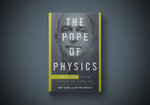The film “Oppenheimer” has become a box office juggernaut. His right-hand man, Nobel winner Enrico Fermi, is also worthy of the spotlight.
This item is available in full to subscribers.
We have recently launched a new and improved website. To continue reading, you will need to either log into your subscriber account, or purchase a new subscription.
If you are a digital subscriber with an active subscription, then you already have an account here. Just reset your password if you've not yet logged in to your account on this new site.
If you are a current print subscriber, you can set up a free website account by clicking here.
Otherwise, click here to view your options for subscribing.
Please log in to continue |


The film “Oppenheimer” has become a box office juggernaut, already earning more than $900 million worldwide. The story of J. Robert Oppenheimer, the theoretical physicist in charge of the Manhattan Project, which produced the atomic bomb during World War II, is also likely to earn a series of Academy Award nominations, movie experts say.
But Oppenheimer's right-hand man, Enrico Fermi, is also worthy of the spotlight, said Gino Segre, retired University of Pennsylvania physics department chairman. Fermi assembled the world's first nuclear reactor in 1942 and won the Nobel Prize for Physics in 1938.
“His work was worth a whole basket full of Nobel Prizes,” Segre said of Fermi. “He shaped how we live today in a way that has never been surpassed since.”
Segre and his wife Bettina Hoerlin, who formerly lived in Chestnut Hill and Mt. Airy, have written the new book, “The Pope of Physics; Enrico Fermi and the Birth of the Atomic Age.” The biography explores the life and career of a man considered by many to be one of the greatest scientific geniuses of all time, on a par with Einstein, Newton and Galileo.
In the book, Segre and Hoerlin conclude that Fermi and two physicist friends, Wolfgang Pauli and Werner Heisenberg, “produced a revolution in physics” and that without their contributions to scientific progress, “the world would not have been able to produce semiconductors, transistors, computers, MRIs, lasers and so many of the other inventions that shape our life. In a very real sense, we live in a world they created.”
Segre and Hoerlin, of Center City, have distinguished records as scholars and authors. Hoerlin, a doctorate degree holder in public policy sciences who served as health commissioner of Philadelphia, taught public health at the University of Pennsylvania and has been a visiting lecturer at Haverford College and Oxford University. She is also the author of “Steps of Courage: My Parents’ Journey from Nazi Germany to America,” one of the most compelling, inspirational books I have ever read.
Hoerlin actually knew Enrico Fermi in Los Alamos in the 1950s when she was a teenager attending Los Alamos High School. She was living there because her father, Hermann Hoerlin, was a physicist working there who had escaped from Nazi Germany in 1938 with his wife (Bettina's mother), Kate Tietz Schmid, whose first husband, prominent cellist Willi Schmid, had been murdered by the Nazis.
“I met Fermi a couple of times on weekend hikes when I was 14 in the summer of 1953,” Hoerlin told us last week. “On those hikes, Fermi was in awe of my father, who had held a world record in 1930 for having summited the highest mountain, a peak in the Himalayas. My father, a physicist, on the other hand, was in awe of Fermi and his accomplishments. So the hikes, one could say, were 'awesome!' I remember on one hike Fermi offered me an orange. A lovely gesture. He was a humble man and a good person. He exuded both those qualities.”
Hoerlin also met Oppenheimer in the summer of 1953 in Los Alamos. “It was at a cocktail party, a frequent Los Alamos occurrence,” she said, “where I was introduced to other teenage daughters and sons of physicists. I knew I was supposed to be wowed by meeting Oppenheimer, but in typical adolescent fashion, I answered my parents’ queries about him with a shrug of the shoulders.”
Segre, who has authored other scientific books, also had a personal connection to Fermi. Segre's uncle, Emilio Segre, also a Nobel Prize winner, was Fermi's first student in Rome, and they worked closely together for 20 years, including their years with the Manhattan Project.
Gino Segre was born in Florence, Italy, in 1938, but his parents, an Italian Jew and a German Catholic, “wisely decided to leave Europe, so we decamped for New York City.” Segre later attended Harvard to earn a degree in physics, graduate school at the Massachusetts Institute of Technology (MIT) and completed postdoctoral work at the international accelerator laboratory in Geneva, Switzerland. For five years, he was chairman of the physics department at the University of Pennsylvania, where he won numerous awards. He has a brother, brother-in-law, uncle, nephew and several cousins who are all physicists.
In writing about “The Pope of Physics,” Frank Wilczek, a Nobel prize-winning physicist at MIT, offered kudos to Segre and Hoerlin, who Wilczek said have used fresh material from Fermi’s inner circle to create a book in which “Fermi's life becomes a brilliant — and true — historical novel.”
For more information about “The Pope of Physics,” visit henryholt.com. Len Lear can be reached at lenlear@chestnuthilllocal.com